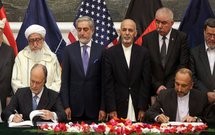 After 13 years of war, the Obama administration and Afghanistan's new government signed a bilateral security agreement Tuesday. The agreement is intended to avoid repeating the problems that arose in Iraq when Washington and Baghdad could not agree on a status of forces agreement in 2011. But the Afghan deal is unlikely to keep jihadis forces in Afghanistan from taking advantage of the vacuum left behind by departing Western forces.
After 13 years of war, the Obama administration and Afghanistan's new government signed a bilateral security agreement Tuesday. The agreement is intended to avoid repeating the problems that arose in Iraq when Washington and Baghdad could not agree on a status of forces agreement in 2011. But the Afghan deal is unlikely to keep jihadis forces in Afghanistan from taking advantage of the vacuum left behind by departing Western forces.
The bilateral security agreement will allow 9,800 American and 2,000 NATO troops to remain in Afghanistan for a decade after Dec. 31, when the international combat mission will end. The remaining troops will mostly train and support Afghan security forces, but the deal permits U.S. special operations forces to conduct counterterrorism missions in the country. There is also a $12 billion financial aid commitment to the Afghan government.
Although former Afghan President Hamid Karzai refused to put his signature on the bilateral security agreement because of concerns about his legacy, the signing of the accord was a done deal after every contender in the presidential race pledged to sign it. The only questions left were who would succeed Karzai and when. But when the runoff vote between now-President Ashraf Ghani and now-CEO Abdullah Abdullah was marred by allegations of fraud, there were fears that the controversy might drag on beyond the end-of-year deadline.
Washington had to step in, with U.S. Secretary of State John Kerry mediating some 27 meetings between Ghani and Abdullah, resulting in a problematic power-sharing agreement between the two last week. That Washington had to press the two sides into sharing power in a post-Karzai regime so that a deal could be signed bodes ill for the future security and stability of the fledgling democratic system. It is unclear to what extent the post-NATO, post-Karzai state will be able to impose its writ on the country and limit the scope of ungoverned spaces.
Meanwhile, in neighboring Pakistan, where democracy is much more advanced, mainstream political parties have been unable to create a framework to enable Islamabad to battle its own Taliban rebels. The result is familiar: Large areas on both sides of the Afghanistan-Pakistan border are likely to remain a sanctuary for jihadis fiefdoms.
This is exactly the situation on the Syria-Iraq border, where the United States, even before it was able to wrap up the war in Afghanistan, has begun airstrikes against the transnational jihadis group the Islamic State. The Islamic State has proved far more lethal than al Qaeda by controlling territory in the heart of the Middle East. The hope is that the bilateral security agreement will help the United States avoid the same fate in Afghanistan, but Washington can only do so much if the regional players cannot cooperate with each other or even themselves. Therefore, both border regions are likely to see more conflict because the regional meltdown has reached levels that outstrip U.S. capabilities.
Courtesy : Stratfor (www.stratfor.com)